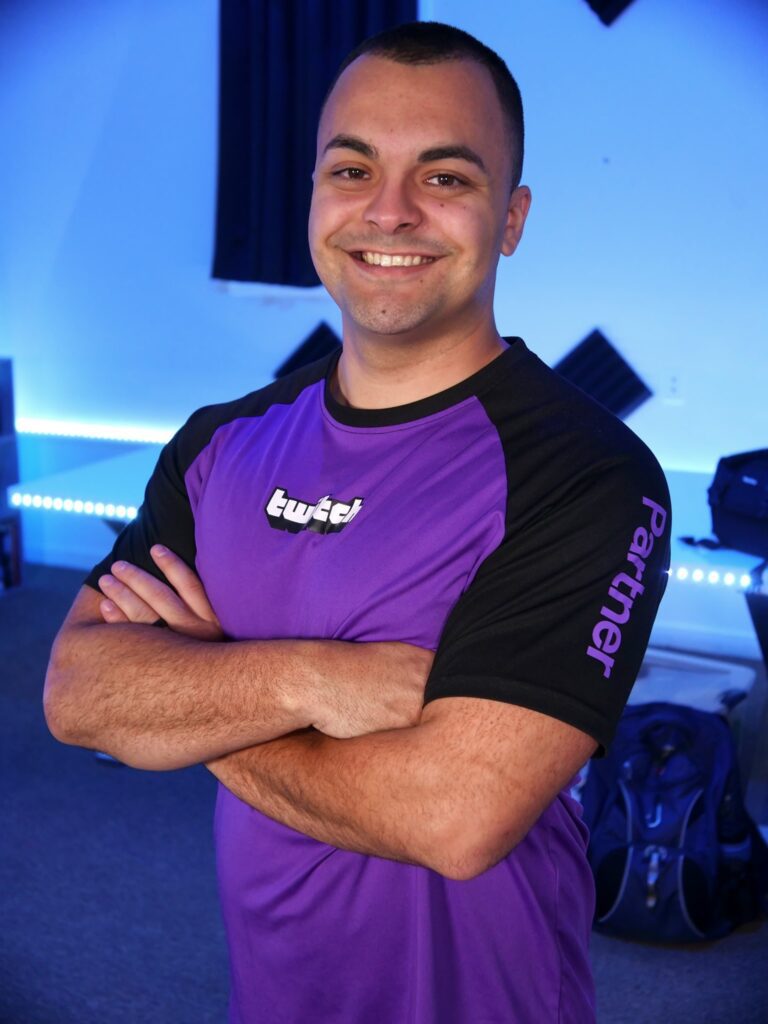
Did you know? There are 2.8 billion gamers worldwide. That’s twice as large as the largest country in the world! That means the video-gaming community is more than a third of the world’s population with more than 200 million gamers in the U.S. alone. Made up of 59% men and 41% women at the average age of 34, the gaming world is an untapped population for building…a church. Yes, a church!
 In 2014, when Matt Souza started live-streaming his video-game play on Twitch.tv to connect with other gamers and share the love of Jesus, he wasn’t planning to build a church community.
In 2014, when Matt Souza started live-streaming his video-game play on Twitch.tv to connect with other gamers and share the love of Jesus, he wasn’t planning to build a church community.
For those unfamiliar with Twitch.tv, it is a platform to watch a broadcaster play video games and interact with them live. To understand the reach, every day Twitch.tv has 25 million users on its platform! “That’s why I began streaming,” said Matt Souza, Twitch broadcaster and pastor of GodSquad Church. “I saw an opportunity to have an influence. While people watch me play, they have an opportunity to engage with a real-life pastor and ask questions. I began to share the Gospel, and since then, we have seen over 1,000 gamers give their lives to follow Jesus! Today we are interacting with over 600 people a day and 7,600 gamers a month. And it was out of this community we birthed GodSquad Church, the world’s first church for gamers.”
GodSquad Church exists to connect gamers to God by meeting them where they are. Every week gamers can experience services with worship and the teaching of God’s word. Throughout the week they can experience video-based small groups, community gatherings and pastoral care. Today their church is ministering to people in over 73 countries because gamers are all over the world. “The games we play on screen might not be real but the people behind the screen are,” said Matt. “If we are to obey Christ to go into all the world we must also go into the virtual world.”
But for Matt, building a church for gamers was not in his original plan. In fact, his story begins with first uncovering his true identity in Christ, following God’s call on his life and then responding to a need he started to see in the gaming community.
ARVE Error: Mode: lazyload not available (ARVE Pro not active?), switching to normal mode
In this interview with Matt Souza, we talked to him about his identity, how GodSquad Church came to be, the obstacles he’s had to overcome along the way, his dream for the future and how The Global Leadership Summit has played a role in supporting his leadership journey.
Have you always been interested in video games?
I have been playing video games my whole life. My dad introduced me to video games when I was young. As I got older, gaming really became more than something I did with my dad, it became a passion. But when I was growing up, video games were not cool. For example, there’s a popular game called World of Warcraft—this was one of the nerdiest games you could play. In high school there was a World of Warcraft table in the lunchroom, and if you dared go sit at that table, you were “cut off from the rest of social society.” It sounds funny today, but it was reality back then.
If we are to obey Christ to go into all the world we must also go into the virtual world.
There’s a part of me that is sad today because I never wanted to be associated with the unfortunate negative connotations of gaming—that people are irresponsible, immature, can’t hold down a job or that they’re 30 and live in their mother’s basement. So, I never ended up going over to that table. And honestly, it’s something I think about to this day—I wonder if I could have impacted those people, made those people my friends?
Wow, that table really had an impact on you. Something tells me thinking of the kids at that table has played a major role in what you’re doing today. Can you tell us more about your pastoral background?
I went to North Point Bible College in Massachusetts where I studied pastoral ministries and biblical theology. My wife and I both ended up working in the church together. I was your idea of a “normal pastor,” but one who played video games on the side.
When I started working at a local church, I had a genuine fear of being found out as a gamer because of the negative connotation that goes along with it. What would people say? For some, they don’t care, but the reality is some people really do care. They would find out and say, “But I thought you were a pastor?” I wanted to be a man of integrity and character, and so honestly, it was a kind of an identity crisis thing for me in that I felt like I was living two different lives—one I showed the Church world and one I showed the public world. But God really began to work in my heart and help me understand I’m not loved because I’m a gamer or non-gamer, my identity comes from the fact that I’m a child of God.
How did God help you uncover your identity and follow his call?
While embracing the “weird” parts of me, God really took me on a journey of embracing who I am in Him. It’s now become one of the greatest stories of my life as I continue to connect with people at the table. God made me to be a gamer so I could connect with other gamers. I realized that instead of hiding my gamer side I should be using it to build common ground interests with others.
I’m not loved because I’m a gamer or non-gamer, my identity comes from the fact that I’m a child of God.
I actually didn’t start off with an idea to start a church online for gamers. Where I am today started as a process of God working through me on my identity and becoming comfortable in my own skin. I said, “Ok God, if it’s cool for me to be a gamer, how do I connect with gamers?”
When did you discover the world of video game live streaming and realize it could be a ministry tool?
I started wondering how many gamers around the world felt like me—feeling the need to connect. I wondered if there was a way for all of us to connect outside of playing the same game. That was when I found Twitch.tv—a way for people to watch a live stream of someone playing a video game. It’s like a social event where the people watching can interact with the player and ask questions.
As soon as I saw a player respond to a live question, and realized his 25,000 viewers heard his answer, my mind immediately thought, “Can you imagine if he was talking about Jesus?” All these people have gathered around a common interest and there is opportunity to connect.
I thought, I’ll get on and while people come in to watch, I’ll talk about Jesus.
The average gamer today is 34 years old, owns a home and has children, and they desire to connect with others too. So, I wanted to use it as an evangelistic tool. I thought, I’ll get on and while people come in to watch, I’ll talk about Jesus.
Is live streaming now your full-time ministry?
Even though I’m young, the world of live streaming is still a relatively new world. It was new to me when I started streaming back in 2014, and at the time, it was just a hobby on the side. My wife and I were both working on staff at a local church in Connecticut at the time.
I actually didn’t know people could do live streaming for a living! I also never had the idea of doing it in terms of ministry. So, if you were to ask me when I was young, “Do you think one day you’ll play video games to talk about Jesus?” I’d say that’s not even a thing! Now I’ve dedicated my life to “go over to that table” via live streaming. My life looks very different than I thought it would be, in the best way possible.
How did GodSquad Church come to be?
Here’s where things got interesting, but also heartbreaking at the same time. While live streaming, people started to give their lives to follow Jesus and asking about their next step. So, I would tell them to get plugged into a local church. Then these gamers were going out of their comfort zone to find a local church. Fortunately, some of them got connected to some great, loving churches, but others didn’t have the same experience. I heard common stories about gamers finding churches in their area and walking in wearing say, a Dungeons & Dragons t-shirt, then being told to leave and change their clothes.
If we can’t find a church for these people, I will make one for them.
There were more and more bad stories than good stories, and I found myself at a crossroads. At this point I was doing this as a hobby and asked myself, “What do I do?” I thought, “If we can’t find a church for these people, I will make one for them.” Out of that reality, our church was born to connect gamers to God and meet them where they’re at.
So, it wasn’t even in your plan to start a church!? Wow. It’s incredible how GodSquad was birthed out of a need for gamers to have that community. What is that community like?
Gamers like to gather online together, many of them after they put their kids to bed. They voice chat, hang out and play games together. It’s a part of their life. In fact, 140 million people are on Twitch every month, gaming together and naturally building community. A lot of these gamers are hungry for community, but normally they’re finding community in the wrong places. So, the idea of having a church online teaching the word of God in a place they can go that brings the light of Jesus in a dark place is one of our core values.
I’ve had people say, “I don’t believe in God, but I can’t stay away from this community.” There are people from all over the world joining me online who never would have stepped foot in a church. I’m not going to say we were the first ever online church. People have been doing it long before we were. But we were one of the first churches that started exclusively online. Most churches start physical location and then go online. We started only online and then top of that, we were also playing video games!
There are people from all over the world joining me online who never would have stepped foot in a church.
What part of this community excites you the most?
The part that excites me the most is being able to interact with people who would have never stepped foot in a church. It happens all the time. I stream on Twitch most days over eight hours a day, Tuesday through Friday, and Saturday for three hours leading up to church. People will find me on the platform whether I’m playing a game they’re interested in, or by a title their interested them. Then we’ll talk and I’ll say something like, “Glad to have you here. Know you’re loved and valued.” And we begin to build relationship.
There are moments for sharing the Gospel and answering questions, but when people join, I don’t go into it right away—we start with organic conversation. Then there’s the people who are just listening. Of course, I get people coming in being disrespectful as well, but then I have a chance to love on them and say something like, ‘you don’t have to believe what I believe to be here’ and often they’ll stop being rude.
The video games we play on screen might not be real, but the people behind the screen are real. This ministry isn’t about gaming. Gaming is simply the platform to connect with people.
What is one of your favorite stories that has come out of this ministry?
We’ve been blessed have to so many stories from people around the world, but this is one of my favorites. Because we’re an online church, we do online baptisms. We give people the opportunity to find a body of water and they set up themselves and we stream it publicly in front of the world, and we baptize them in the name of Jesus.
Ken was a man from the Netherlands who didn’t know Christ. He found our church online and gave his life to follow Jesus. He wanted to be water baptized so badly but didn’t have a body of water near him, so he grabbed his trash receptacle, cleaned it out and filled it up with water. Then he got in it and publicly, on the internet, shared how God had changed his life, and we baptized him!
This is such a different way of doing church than people are used to. I imagine you have a lot of critics?
Back in 2014, when I first started streaming, there were some people who were really against me. Some said it is never going to work. They told me to quit. They told me it was the dumbest idea they’d ever heard. When 2020 hit, some of those same people wanted my help to learn how to do church online and we had the opportunity to help them. But I wasn’t bitter or angry. I was excited to see the Church of Christ who serves the most creative God in the world being open to the idea of creativity. But we’re not accepted by most churches—they don’t fully grasp or understand what we’re doing, especially when it comes to video games.
I don’t need my critics to like it. I’m not here for them. I’m here for the people at the table.
I just traveled to an event where there were 300 church leaders represented. 95% of them are still not on board with the concept, but seven years ago was 0%, so at least we got 5%! We’re still making progress.
How do you handle the critics and not let them affect your mission?
When people are coming against you, it can be easy to think that maybe they’re right—maybe it is the dumbest idea ever? But I come back to the why.
My why comes back to that lunch table at school. I remember that I’m not doing this for people’s approval anyway. I don’t need my critics to like it. I’m not here for them. I’m here for the people at the table. And as long as people are at that table, I’m not going to be concerned with the opinions of those who are not at the table. The Lord called me, not my critics. He’s the one I obey. He’s the one who gave me this vision, purpose and plan.
What are you dreaming up for the future?
The online church and the daily broadcast will always be the core foundation of what I do. For one thing, I believe it’s the most effective. To give you some basic stats, we’re reaching over 600 people every single day and I am what some would consider to be a small streamer on the platform. Some popular broadcasters are interacting with 400,000 people a day. That is exponentially more people than churches will reach in their lifetime. But there’s been one aspect of the ministry that’s missing.
When I study the Book of Acts in Chapter 2, it says, “they continue to meet together daily in the temple courts.” I look at Christianity as a whole and see that there’s less and less of a daily life in community than I believe God originally intended. I’m always up for trying to do new creative and innovative things, but there’s also some things that should not be changed. There are some things that are old, but they work. But how do we modernize it? How do we apply the Bible in today’s world? And how do we make it relevant to gamers?
When I think about the idea of the modern-day temple courts, I think of what is called the LAN center. Essentially, it’s a room or building that has a ton of video games in it and it’s a gathering place for gamers. They were big in the 90s. It’s a social place where people can come together and be together while playing games.
What a great idea! Do you think LAN centers could help create a safe space for gamers to be part of a church community?
I surveyed 100 non-Christian gamers that I knew and asked them all if there was a LAN center where gamers could hangout, play games, drink coffee, and eat snacks, but it was inside a church, would they go? All 100 people responded yes. Why? Because they want to come to a place in a community where they can be 100% themselves.
Curious…if online works so well, why not remain just online?
It’s a great point. But there are gamers who live in the online world who still thrive better in a physical church setting. I really believe that online church, when it’s done well—practicing the sacraments, obeying the word of God, etc.—can be a full expression of the Body of Christ. But it’s also not for everybody. Some people want to be able to shake hands and be in-person too. So, the physical LAN center location helps us meet both needs, but the entire church is hearing the same thing and watching the same service.
Has Covid-19 affected your plans for a LAN center?
In the beginning of 2020, we were all set to launch our LAN center. We rented a place to do our live stream services. Then Covid hit the world and changed everything. It was a really big reminder that everything is in God’s timing. So, we’ve gone back to the drawing board and put that idea on pause. But it is our long-term vision to have LAN centers all over the country and around the world so that gamers can fellowship, spend time with each other and serve in outreach in their communities.
I first heard about The Global Leadership Summit four years ago and I was blown away. For me, it was the first leadership conference I ever attended. It was a whole new world for me. I believe you guys are inviting some of the sharpest minds on the planet. And I love the Summit, not only because it’s teaching top-notch, world-class leadership, but it also fits so perfectly within the world of ministry and secular leadership.
I first heard about The Global Leadership Summit four years ago and I was blown away.
Through the Summit, I’ve learned a lot of my approach on how to interact well with non-Christians in the gaming community, which is generally atheistic. We don’t come out swinging like, “Hey, here’s the Gospel, stranger!” That doesn’t fly in the gaming community. I believe people find Christ through relationship.
I’d recommend everyone do it! There are people that every single one of us can learn from. My team is better. Our church systems are better. And the other 363 days of the year we’re practicing the principles learned at the Summit, and now we’re following the voices that the Summit trusted and put in front of us. So, we are continuing to be sharpened. We love it.
Want to Help Matt Souza share the Gospel?
Check out his video and discover how one simple click and three seconds of your time can help encourage and show the love of Jesus to gamers around the world.
ARVE Error: Mode: lazyload not available (ARVE Pro not active?), switching to normal mode



 In 2014, when Matt Souza started
In 2014, when Matt Souza started 








Recent Comments